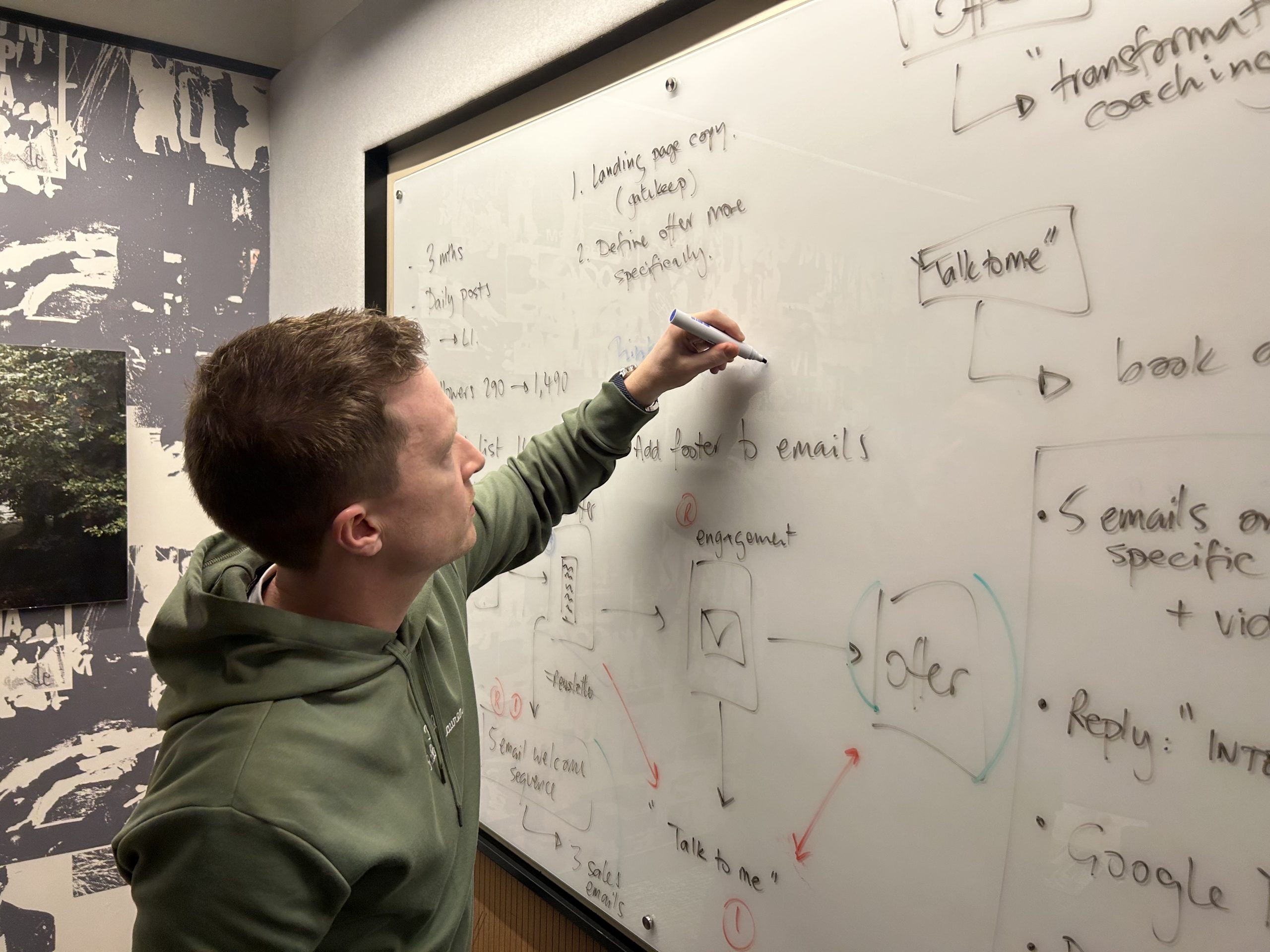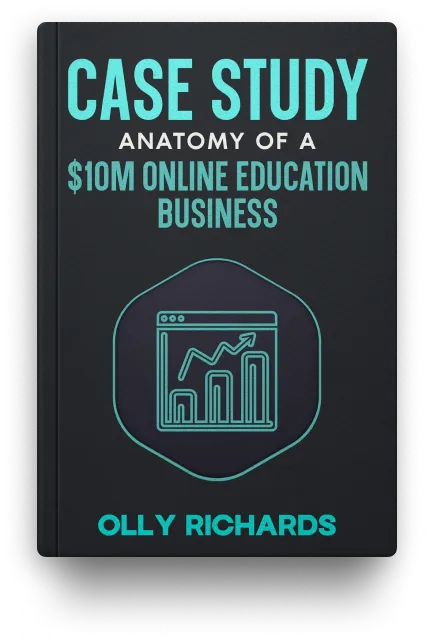Last week, I was at a Mastermind event in London with YouTuber Ali Abdaal.
True to form, I started the day with a very bad joke.
I was worried.
Was this the end?
Had I destroyed the day before it even began?
Turns out no.
The day got significantly better from there on in.
Anyway, the format of the mastermind evolved based on the interests of the individual entrepreneurs in the room, and one big things that came up was vision.
How do I create a vision for my business?
Ali asked me to lead the session, and during all of 17 seconds of preparation, I scribbled down four questions that I’ve discovered to be genuinely useful about vision, and that have really helped me.
The session went down really well, so I thought I would share the questions with you here.
..Quick aside —
Looks like my conversation with Jeff Walker from the other day went to spam for lots of people.
It was a 30-minute chat about the story of my first product launch and a very useful rundown of what’s working for product launches in 2025.
In case you missed it, here’s the video.
..So…
Conversations around vision can lead you down a fluff-filled rabbit hole real quick if you’re not careful.
But after many years thinking about vision…
Having people tell me that I desperately need a vision…
And invariably making me feel inadequate for not having one…
I have landed on a few points that I think are highly relevant for anyone wondering what their vision should be.
1. Do you even need a vision?
Look I know Elon Musk wants to go to Mars.
That’s a vision.
But Elon Musk also sleeps under his desk and works 20-hour days.
Can it really be the case that we all need an earth-shattering, future-defining vision in order to be worthy as an entrepreneur?
Well I’m gonna say no.
You might be wondering what my vision was for starting StoryLearning.
Surely I planned category domination from the beginning?
Surely I always wanted to publish and sell millions of books?
I wanted to alter the future of language learning right?
Well, I’m sorry to disappoint but the truth is I never had a vision.
The only vision I had was to escape my job and never see my boss again.
That’s the truth behind why I got started.
But then, as soon as I started joining masterminds I would be asked the inevitable quesitons:
“So, Olly, what are your company mission and values?”
…and I would concoct various empty statements like:
“I want to help a million people learn a new language”
“I want to change the way languages are taught around the world.”
You know the deal…
You’ve heard this kind of vision statements before…
And… none of these are “untrue” but I would be flat-out lying if I told you that that’s what actually motivated me.
It wasn’t.
In the room last Friday were people in all kinds of situations:
Yes, there were 24 year olds making millions of dollars, with all the energy and ambition in the world.
But was also:
- a new mother with a little baby to look after
- someone who had just quit their job to change career
- an entrepreneur whose wife couldn’t afford to quit her job yet
Could it be the case that you don’t need a vision right now…
And what you ACTUALLY need is a bit of time to look after yourself and take care of your own business?
Spend some time with your child?
Build up a bit of a financial buffer so you’re not operating out of scarcity?
Look…
If you’re the kind of person who has a world-changing mission then all power to you, but if you’re not, then please don’t feel inadequate about it. Not for a second.
Vision can come later if it comes at all.
2. Your personal and company visions can be different
One question came up that was:
“How do you motivate your team if you don’t have a vision?”
My response…
What makes you think your personal and company visions have to be the same?
For example, in my case, I own four different businesses.
The vision for each of my businesses is different.
They can’t all be my personal vision.
What if I suddenly found myself acquiring a paperclip business tomorrow?
Would I suddenly concoct a personal vision of changing the world one paperclip at a time?
Obviously not.
It’s perfectly possible for your company vision to be separate from your personal vision.
You can live your personal life in whatever way you want, but then when you go to work, you operate a company that has its own set of visions, and you can rally your staff around this.
So don’t feel that you need to design your company in your own image.
Of course, if your company and personal visions happen to align, that’s a great strength.
(in the case of my business brand, personal and company vision do actually align, because my personal values are all around creativity and teaching, which is exactly what I try to do with this business, but that’s not necessarily the same for my other businesses.)
The point here is:
Don’t let a conflation of your personal and work life hold you back.
3. How can I be of service to others?
Now, this runs the risk of sounding a little trite, but let me explain.
I’m fortunate enough to know many, many millionaires and successful business owners.
And the one thing I can tell you — for sure — is that once you make the money, you realise was never the thing that really mattered.
This is why people with lots of money invariably end up spending their time on projects that benefit others and aim to have an impact.
It could be Arnold Schwarzenegger with his after-school programmes in inner cities.
Or it could be helping elderly people in your village get to the shops.
Whatever the scale, this is the area where people tend to find value.
And so if you’re in search of a vision for yourself, then a very good place to start is: “How can I be of service to others?”
If you can align your business with fulfilling a deeper service to other people, it’s a fairly sure bet that that will be meaningful.
Final question, and perhaps my favourite…
4. What does your 80-year-old self regret?
I first knew this as the “rocking chair test” from Tony Robbins back in the day.
Imagine you are 80 years old, sitting at home in your rocking chair, swinging back and forth, mulling over your life and how it went.
What do you regret doing?
What do you regret not doing?
Whatever comes up, that’s a pretty darn strong indicator of how you could be orientating your life right now.
Here’s why this is powerful:
We tend to live our lives based on the “gap”.
The gap between where we are now (what we have) and what we want to achieve (what we want).
This roots us very much in a deficit mode.
We spend most of our lives just trying to fill a gap that we perceive to be there.
For example, “I can’t be at peace until I have at least $10 million in the bank.”
But as soon as you position yourself at the end of your life (the 80-year-old in the rocking chair), things start to look quite different.
The money doesn’t matter anymore; you can’t really spend it now.
The only question that remains is: When you look back on your life, what do you actually value?
What mattered to you?
What didn’t?
By imagining yourself at 80 years old, it flips your frame.
You don’t need to think very long and hard about this either.
Most likely, when you do this exercise, you will immediately know what mattered and what didn’t.
If you know that your 80-year-old self would believe strongly about something, that’s a surefire sign that you should take it more seriously yourself now.
..
Anyway, I hope some of this helped.
If you’d like to reply and let me know about any penny-drop moments that came from this, I’d like that.
Namaste,
Olly

